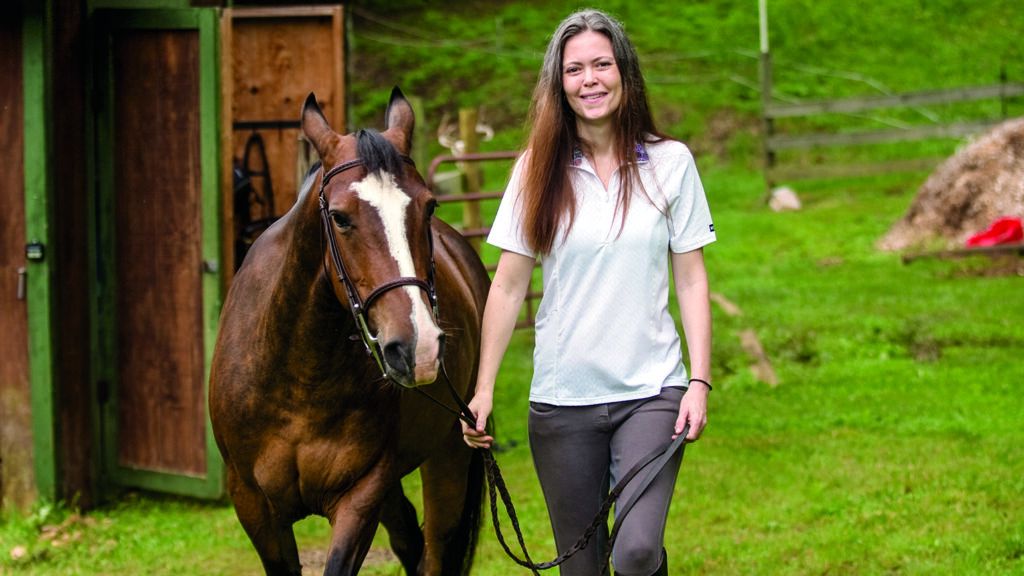‘‘Hang on,” I said to my seven-year-old. I pried markers from the hands of my four-year-old twins. “Please don’t color your bodies.”
The Saturday after Thanksgiving—another day in the life of a working mom. I loved my three boys, my husband and our life in the woods and pastures of Appalachian Virginia, but it wasn’t easy putting my passions on hold to raise a family. I’d been a distance runner and a psychology professor before we had kids. Now the runs were short—I had to get home to pick up the twins from preschool, my oldest from first grade—and I taught only one class a semester.
And then there were the horses—Phoenix, who I had rescued in college, and a small pony, Harriet. They needed my attention too. We were diligent about rotating their pastures, bringing the vet around and changing their shoes. But riding? Who had the time?
Even more so than running and teaching, horses fed my soul. I still remember Shorty, the pony I’d learned to ride on as a kid, and all the horses my parents leased for me in the summers. Riding made me feel like I was flying, like I was free. I missed that.
If scientists analyzed my genome, I suspect they’d find bits and pieces of the DNA of the horses I have known and loved over the years. Not everyone can take care of these magnificent animals, though. Like the neighbors down the road. Somehow they’d gotten ahold of two mares—one older, one younger—and a stallion. Their yard, crammed with junk cars, old tires and scrap metal, wasn’t the ideal environment for their many dogs, let alone a small herd of horses. They mean well, I told myself. Maybe they don’t have the knowledge or money to raise horses.
I’d started going over there with hay for the horses, but as the days grew cooler, their ribs became more prominent. Sometimes the animal control truck came by, but nothing ever came of it.
The temperature had plummeted the week before Thanksgiving. The wind picked up, and sleet dripped from the sky, creating huge muck pits. Those poor horses, I thought.
“Can you drive me up the road?” I asked my husband, Paul, on Thanksgiving morning.
“Now?”
I nodded. “I’m worried about the old mare. She’s skin and bones. What if she doesn’t survive the night?”
We arrived at our neighbors’ ramshackle house. Carrying an all-weather horse blanket, I picked my way through mud and rubble to the front door. Dogs howled at my knock.
A woman stepped outside. “Yes?”
“Sorry to bother you so early on Thanksgiving,” I said. “But your old mare doesn’t look well.”
“Vet says there’s nothing we can do,” she said, her jaw set.
“She’s too skinny to stay warm on her own,” I said. I held up the blanket. “Would you mind if I put this on her?”
My neighbor’s face softened. “Thank you,” she said. “That would be fine.”
The mare didn’t object when I slipped the blanket over her. This is no place for a horse, I thought, scanning the pen—piles of manure, no food, no greenery. Her head hung low, as if the weight of the world was dragging her down. I tightened the buckles around her belly, and the second, smaller mare came over. She sniffed my fingers as I fussed with the buckles. I looked at her. She was a bay with a white blaze running down the center of her face. She looked back at me, her eyes alive with curiosity. And hope. She hadn’t given up. Not yet.
Later that day we sat down for Thanksgiving dinner, but I couldn’t get that young mare out of my head. How was it fair for us to feast when there were starving animals just down the road?
Now I wiped the marker stains off my twins and thought, as I had several times since Thanksgiving morning, Maybe I can still save her.
Armed with a 50-pound bag of alfalfa and some cash, I bartered with my neighbors for the little mare with no name. She was two years old but had never had her feet trimmed, worn a halter or learned to be caught and led. It took some time to walk her to our property.
“You did what?” Paul asked.
I surprised myself too. I was already exhausted from juggling too much. How was I going to take care of an untamed, malnourished horse? Yet something had pushed me to save this mare and I couldn’t turn back now.
“It’s temporary,” I said. “Just until we can find her a suitable home.”

The next few days, I observed the wary mare. I used my most soothing voice to calm her. “Good girl,” I said as I brushed her. Her coat was dull and matted, but I could tell she was starting to enjoy her twice daily brushings. I decided to name her Francie. “Like the girl in A Tree Grows in Brooklyn,” I told Paul, remembering how the character had overcome adversity and thrived.
Our Francie faced more than a few challenges in her first weeks with us. One morning, I spied thousands of threadlike worms in her manure. I brought a sample to the vet, which revealed small strongyles, the most unwanted of equine parasites, because they can burrow into the intestines and migrate to different organs, making a horse very ill or worse.
“She also has roundworms,” the vet said.
I told him that I had already attempted to deworm Francie with a mild ivermectin.
“You’ll have to use something stronger.” He prescribed a broad-spectrum dewormer.
That Friday the vet finally made it out to our house to see Francie. He’d had emergencies and arrived four hours late. It was dark and bitterly windy, but I was thankful he’d come.
“She has the worst case of strongyles that I’ve ever seen,” he said. He recommended a double dose of the heavy-duty dewormer for five days and gave me some other meds in case she were to colic from the strong dose.
I’d hoped to move Francie into a shelter with Phoenix and Harriet before an ice storm hit. The vet said it would be best to keep her in full quarantine until she completed the deworming program. I looked at our newest horse, just as I had the day I met her. She looked back, her eyes still hopeful. “You can beat this, Francie,” I whispered to her, stroking her neck. “I know you can recover and thrive.”
I’d been so focused on trying to get Francie well that I hadn’t registered what I’d done. Here I was, almost 40, with three little boys and a part-time job, and I’d taken in a sick horse I had to start from scratch with. But this wasn’t just another thing on my plate—this mare needed me desperately. And in some way I didn’t quite understand, I needed her.
It took a while for Francie to get used to being handled, but it amazed me each time she let me slide the halter over her head. As the months passed, she learned to be saddled, to work on the lunge line, to accept the bit. Then one day I found myself sitting astride her as my husband led her around the riding arena. She spooked easily, so I talked to her as we rode. Sometimes I even sang to her (truthfully, she’s the only one who would care to hear me singing).
Francie’s personality emerged as she settled down. I had a small speaker for my saddle and discovered she liked riding to music, particularly movie theme songs. I’d put on music that made me think of horses charging across fields into battle, and she’d lengthen her stride and strut across the arena.
I never did go about finding that suitable home for her. The neighbors’ other two horses were cared for at cost by the vet, then re-homed. I hope their new owners feel as lucky as I do to have Francie.
I didn’t realize how much I needed this little mare until she grabbed hold of my heart. I had been caught up in my mom routine, caring for my boys, ignoring my own needs. Doing all I could for Francie was like coming home to myself. I took her in because I believed she could live a full life. Turns out, so can I. Now I make time to ride, to feed my soul. Francie’s got one of the smoothest trots I’ve ever known. Together we fly and feel free.
Did you enjoy this story? Subscribe to All Creatures magazine.




